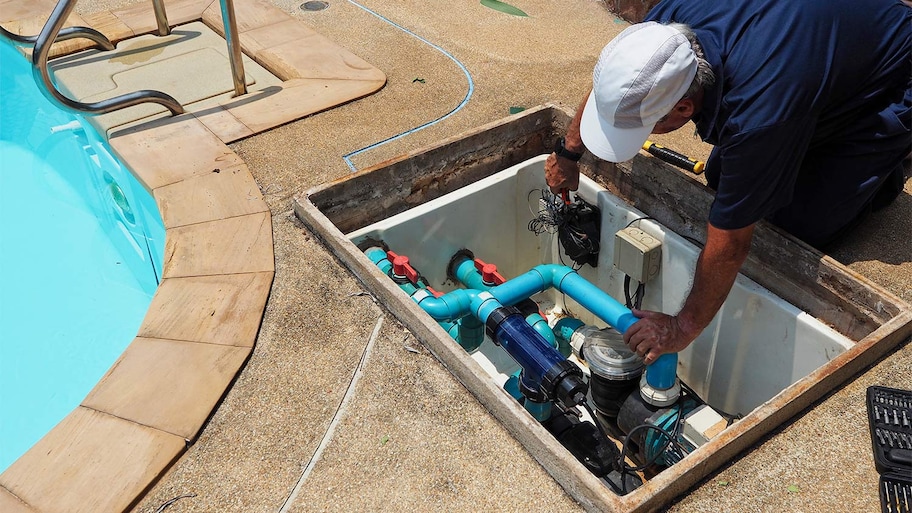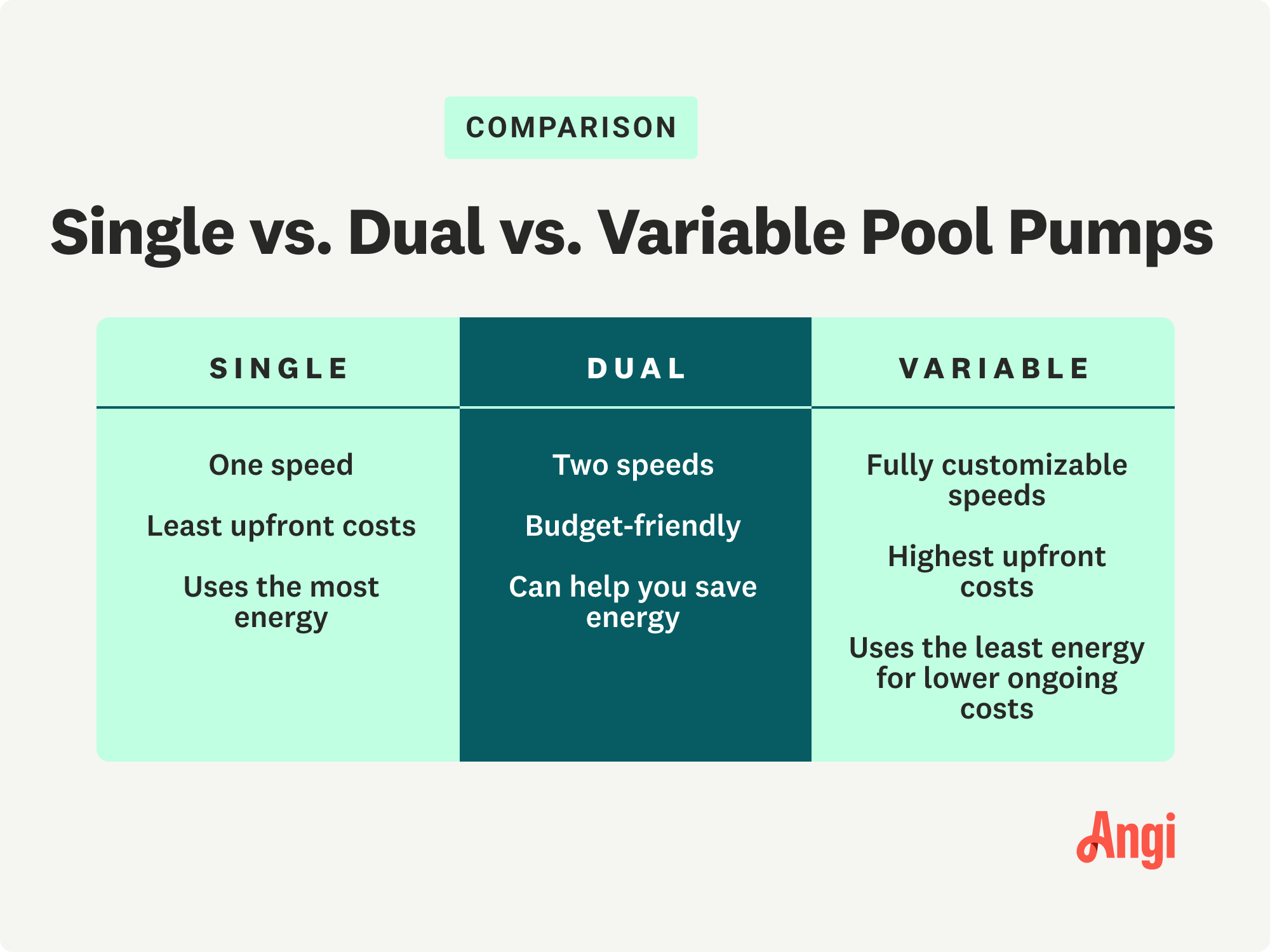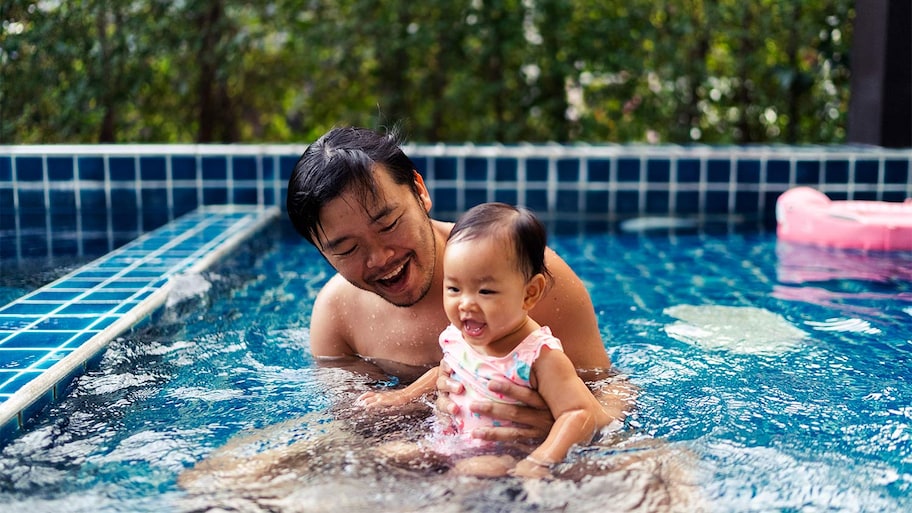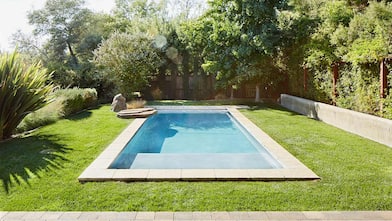This is a purchase to get pumped up about
You’ve figured out that you need a new pool pump—but now what? Since the pump is the heart of the pool’s water system, it’s important to make the right decision. The price of pool pumps ranges from $400 to $3,100, though most homeowners pay $1,750 on average. Get started on the installation process by getting familiar with the details of pool pump costs. From the pump type, size, and more, there are many factors you need to keep in mind.
| Low Cost | Average Cost | High Cost |
|---|---|---|
| $400 | $1,750 | $3,100 |
Pool Pump Cost Breakdown
The cost of your pool pump will depend largely on your pool’s volume. You’ll also need to take into account the pump type, brands, labor costs, and more.
New Pool Pump vs. Pool Pump Replacement
A new pool pump installation ranges between $400 to $3,100, which is about on par with pool pump replacement costs, which run from $500 to $2,800.
In some cases, your pool pump replacement cost may be lower if you’re able to repair your pump with new replacement parts. For example, replacing a pump bearing costs $65 to $300. However, if you need a new pump motor, the repair costs $250 to $2,000, which means it’s usually better to buy a new unit.
Pump Type
One of the largest cost factors in the price of pool pumps is the type of pump you choose. Depending on your pool size, your needs, and preferences, the unit cost ranges between $300 and $2,500. Typically, the best option is a variable-speed, medium-head pump.
Brands
The price of pool pumps can vary quite a bit depending on the brand. Generally speaking, higher-end models can cost 80% more than standard models. Some of the distinguishing features of higher-priced pumps include quality materials, like stainless steel or aluminum motor housing, and high-quality plastic pump housing.
Different models have desirable features like a self-priming function, clear skimmer basket lids, and fan-cooled motors. There are also pumps that have programmable controls (including controls via phone apps), quiet motors, and easy installation.
Size
In order to choose a pump that’s the right size for your pool, you need to know your pool volume. For the most accurate calculations, it’s best to use a pool volume calculator.
If your pump is too small for your pool, you may have problems maintaining your water chemical levels. On the other hand, a pump that’s too powerful for your pool forces your filter to work too hard.
Smaller pools up to 10,000 gallons only need pumps with 0.5 horsepower (HP), while pools in the 20,000 to 30,000-gallon range require a 1.5 HP pump. This can vary depending on the number of water features, if any, you have in your pool.
| Pool Volume (gallons) | Pump Size (HP) | Pump Cost |
|---|---|---|
| 5,800 – 10,800 | 0.25 | $160 – $250 |
| 10,200 – 16,500 | 0.50 | $200 – $1,900 |
| 16,500 – 30,000 | 1 | $200 – $2,260 |
| 21,700 – 30,000 | 1.5 | $200 – $3,300 |
In addition to the horsepower, it’s important to take note of your pool’s flow rate. To figure this out, take your pool volume in gallons and divide it by the number of hours you expect to run the pump daily (usually eight to 10 hours). Divide that by 60 to figure out the gallons per minute, or GPM.
When choosing a pump, make sure that it not only has the right horsepower for your pool, but that it also has the right flow rate.
| Pool Volume (gallons) | Turnover (hours) | Minimum Flow Rate (GPM) |
|---|---|---|
| 18,000 | 8 | 38 |
| 24,000 | 8 | 50 |
| 35,000 | 8 | 73 |
Pool Type
The pool type that you have, whether it’s inground or above ground, doesn’t change the cost of the pump. You can expect to pay $400 to $3,100 for either type. However, if you have water features in your inground pool, it’s an additional $250 to $1,600 for a second pump.
Furthermore, you don’t need a special pump if you have a saltwater pool, as any pump will work. Even so, it can be a good idea to look for a pump with a plastic outer casing, rather than a metal one.
Labor and Installation
The labor costs will vary depending on what you need. Pool pump replacement costs are lower than installing a unit for the first time. If you’re replacing an old pump with a new one that’s the same brand, HP, and type, then labor is $200. If you opt for a different brand and need rewiring or new pipes, the installation costs $280 to $320.
Labor for installing a pump for a new pool is $100 to $400—this amount is usually included in the total cost of a new pool install. For example, if the cost of an above ground pool is $1,040 to $5,900, the pump cost is included in the total.
Pool Pump Costs by Type

There are six main types of pool pumps, and the pricing varies widely between them. Rather than going with the least expensive option, you should consider which pump would be the best fit for your pool. In the long run, this will help you save money.
Single-Speed Pool Pump
Single-speed pool pumps have the lowest up-front costs and range between $250 to $1,100. Although the up-front costs are low, they require lots of energy, so you can expect high utility bills. This is because the pool pump will only run at a single speed, which means that it may run faster than what you need.
In July 2021, laws took effect to regulate pool pump energy efficiency, according to the Federal Register. So at this point, it’s unlikely that you’ll buy a new single-speed pump.
Dual-Speed Pool Pump
Dual-speed pool pumps cost $300 to $1,600 and are more energy-efficient than single-speed pumps. They have two settings (high and low), which is handy because you can run it on the low speed most of the time, and then switch to the high speed when heating or cleaning the water.
Your energy bills won’t be as low as if you spring for a variable-speed pump, but if you’re looking for something that fits your budget, this can be a great choice.
Variable-Speed Pool Pump
Variable-speed pool pumps are the most expensive, running $800 to $2,500, but are usually the best choice for most pools. The speeds are fully adjustable, which helps you better maintain your pool.
For example, being able to lower your pump speed is great because it helps your filters work better. On the other hand, being able to run it at high speeds is useful for when you’re vacuuming.
In most cases, the cost of the unit pays for itself in the first year or two, thanks to the energy you’re saving.
Low-Head Pool Pump
If you have water features like wall sconces, deck jets, and bubblers, you may need a second, low-head pool pump. These pumps cost $250 to $1,600. If you decide to add new features, the pool remodel costs usually include the pump.
Medium-Head Pool Pump
Medium-head pool pumps are also called high-flow pumps. These are $400 to $2,500 and are the most commonly used.
High-Head Submersible Pool Pump
A high-head submersible pump is the only way to keep everything running smoothly if you have pools and spas with large water features. These run from $1,100 to $3,100 and require larger plumbing pipes.
Solar Pool Pump
Anyone who wants to skip the electricity bill will likely be interested in the solar pool pump. After all, there is something very appealing about installing solar panels, the solar pump, and then having zero operating costs. These pumps are $500 to $3,000 and can work seamlessly with solar heaters.
Some pool owners opt to use solar power just for their water features, although it may be a better bang for your buck to install solar power for your main pump too.
Besides the lack of an electricity bill, solar pumps are great because they’re low maintenance and last longer than traditional pumps. You may be eligible for rebates too, so check into that if you’re looking into this option.
Additional Costs to Consider
Besides the unit and installation costs, there are additional cost factors to consider. From utility bills, filter installation, to warranty information—it’s a good idea to go over all of the details so you have a good idea of what your total costs will be.
Cost to Run a Pool Pump
Running a pool pump requires plenty of electricity, unless you went with the solar option. Here is a way to get a rough estimate of your monthly bills.
First, find the voltage and amperage rating of your pool pump, and multiply the two numbers. Divide that number by 1,000, and then multiply that by the number of hours you expect to run the pump in a day. Next, multiply that number by your cost per kilowatt hour (kWh). That gives you a total price per day to run your pool pump.

Pool Filter Installation
Since pumps and filters work together, it’s common to install them at the same time. A new filter installation runs $500 to $2,000, and the final price depends largely on the filter type. As with the pump, choosing the right pool filter is very important to making sure your pool runs smoothly all season long.
The three main types of filters are sand filters, DE filters, and cartridge filters. When choosing one, make sure that the filter you get is the right size for your pump. Otherwise, your water won’t be properly filtered which can lead to a range of problems like inconsistent chemical levels.
Pool Pump Timer Installation
While some pumps come with an integrated timer, yours may not have one. In this case, installing one costs $50 to $100. It’s a good idea to go ahead and install a timer, because it will save you lots of time and money. After all, who has the time to manually flip a pool on and off every day, all season long? And by carefully controlling when your pump turns on and off, you can keep tabs on your electricity usage.
You can choose from analog, digital, and smart timers. For the most convenient option, choose either a digital or smart timer—the latter is appealing for people who love to control their appliances with a phone app.
Maintenance
Pool maintenance costs are $150 to $260 per month. A pool service can handle all of the necessary cleaning and maintenance of your vital pool components, including your pump. Also, hiring someone to do the maintenance means that your pump will be routinely inspected, cleaned, and repaired as necessary. As with anything, the cost of repairing a pool is more affordable when you catch issues early on, so preventative maintenance is a good idea.
If you prefer to DIY weekly pool duties, make sure to check your pool filter’s pressure gauge reading and make sure it’s within recommended levels.
Another important maintenance tip is to close and open your pool properly every season. Doing so will help your pump last longer. In particular, when you’re opening your pool, you need to prime your pump and filter. And when you’re closing your pool, ensure all water is properly drained. Be sure to store the unit indoors while not in use.
Warranties
Because pools have so many moving parts, and some are very costly, it makes sense to get a pool warranty to cover any unexpected repairs or replacements. For the best coverage, consider extended warranties, some of which cover pool pump replacement. This may cost $100 to $200 more per year as an add-on to your home warranty.
Besides a pool warranty, the pump itself may come with its own warranty. This may include a 90-day warranty for a full replacement and a year of parts coverage.
Cost to Install a Pool Pump Yourself
If you decide to install the pool pump yourself, you’ll only pay for the cost of the pump itself, which can range from about $200 to upwards of $3,000. However, if you don’t have experience working with pool equipment, it’s best to leave this job up to a pro.
The pump has to work harmoniously with the filter, and if either unit is improperly installed, you’re bound to have issues down the road. Possible problems range from constant water chemical imbalances, clogs, algae growth, and more. Plus, when you consider that the cost of repairing pools ranges from $240 to $1,100, you’ll see it’s sensible to pay the pro to do the installation right the first time.
DIY Pool Pump Installation Cost vs. Hiring a Pro
You’ll save between $100 and $400 in labor costs if you install a pool pump yourself. Pool pump installation is an in-depth DIY job that requires electrical experience. Don’t attempt to do this on your own without the right knowledge and experience. And if you do have the right know-how to get the job done, it’s likely best to stick with installing a replacement. The replacement should be the same brand, size, and type.
On the other hand, if you need a pump for a brand-new pool, it’s likely best to leave that up to the pros. After all, the work is fairly intensive. It may require electrical wiring or plumbing work.
4 Ways to Save on Pool Pump Costs
There are a few ways you can cut costs when it comes time to install a pool pump.
Opt for Energy-Star Certified: The best way to save on the price of a pool pump is by investing in an energy-star certified variable-speed pump. Although your up-front costs are going to be much higher than a dual-speed pump, you’ll save a lot of money on utility bills in the long run. Certified inground pumps can help you save $300 or more annually, while certified above ground pools could save you $115 or more during its lifespan.
Bundling: You may be able to save money on your pool pump installation costs by bundling it with your pool filter installation. Since the two components work together, it makes sense to take care of any necessary upgrades or replacements at the same time.
Get Three Quotes: It’s a good idea to get at least three estimates before you hire a pool repair service near you. Instead of just focusing on the dollar amount of the quote, do your research and check their reviews. Also, it’s useful to find out if a company’s quotes are all-inclusive, or if there are additional fees you need to consider.
Check for Rebates: There may be federal tax credits for solar pumps, or local energy companies may offer rebates for people who upgrade to Energy-Star certified variable-speed pumps. Check the fine print to make sure you qualify, as you may need to employ contractors from a pre-approved list.
Frequently Asked Questions
If you maintain your pool pump well, it can last eight to 12 years. Besides regular maintenance, it’s important to install the proper-size pump for your pool. If you notice strange sounds or unstable water pressure, your pump may be nearing the end of its lifespan.
It’s a good idea to run the pool pump while swimming because your filter and skimmers will be active to help keep the water clean. Additionally, if you have pool features, you would naturally keep those pumps running while you swim. However, it’s not a requirement to run your pump while you swim.
Ideally, you would run your pool pump as much as possible. But realistically, you should plan to run your pump strategically so you can save as much money as possible on your electricity bills while also keeping your pool clean.
Most pool owners run their pumps for eight to 12 hours a day—not necessarily consecutively. You can opt to run the pump during non-peak hours when electricity is cheaper, which is usually in the evenings and nighttime.
There are several signs that’ll tip you off to pool pump issues. The most obvious is if your pump starts making strange sounds, if the motor keeps turning on and off randomly, or if the pump keeps flipping your breaker.
When you start noticing problems, check to see how old the pump is—if it’s older than eight years, it’s likely time for a replacement.
To install a new pool pump, first turn off the power at the circuit breaker; double check it’s off using a voltage meter. Turn off the water valves, and open the pressure release valve on the pump. Undo the bolts on the old pump, cut pipes from the pump, and remove the unit.
Next, prepare for the new unit by wiring the pump and connecting the wires to the terminal. Install the necessary PVC piping, prime the pump, and install the unit. Tighten anchor bolts, open water valves, and then turn on the power to test the pump.




